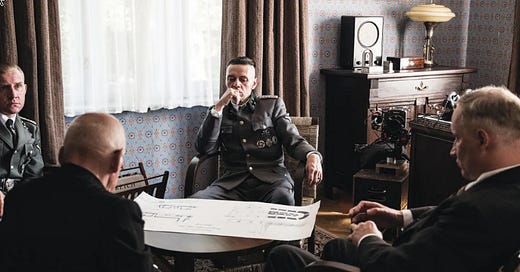
Himmler [who was Auschwitz Commandant Rudolph Höss’ boss] was himself “more normal”, that is, more of a philistine, than any of the original leaders of the Nazi movement. He was not a bohemian like Goebbels, or a sex criminal like Streicher, or a crackpot like Rosenberg, or a fanatic like Hitler, or an adventurer like Goering. He proved his supreme ability for organizing the masses into total domination by assuming that most people are neither bohemians, fanatics, adventurers, sex maniacs, crackpots, or social failures, but first and foremost job holders and good family men.” (Hannah Arendt, Origins of Totalitarianism)
After skimming a few early reviews of The Zone of Interest, I was interested in seeing it while also prepared to be disappointed. As it was not yet available for streaming at the time, I watched it in a movie theater, and was thus able to get the full impact of the visuals and the remarkable soundtrack. It was a remarkable movie which stays with you.
And what you’ve read is correct: the soundtrack (here’s a sample) is in some ways the main character in the film.
I found the whole experience strangely engrossing, as though I were carefully inspecting home movies which I knew contained nearly-hidden glimpses of a horrific crime underway while the family was obliviously filming their little domestic scenes.
The Zone of Interest is artfully made, but its fairly dry tone and mood means it doesn’t feel like an “art film”. For most part, we are watching a middle-class German family of the 1940s as they picnic, play in the backyard, and have dinner with their visiting grandmother—scenes which could be described as (to use a word associated with Hannah Arendt’s writings on the Holocaust and much invoked around this movie) fairly banal.
Except that as we watch these mundane realities, we’re continually unsettled by little eruptions of the reality outside the home: at one moment a shocking image in the corner of the screen or at the next a second or two of unnerving sounds, after which things go back to “normal.”
We might look first here at the connection reviewers have made between the film’s theme and Hannah Arendt’s famous phrase from her report on the 1962 trial of Nazi war criminal Adolph Eichmann, “the banality of evil.” This term has been so misunderstood—as though she had said “evil is unimportant”—that it’s worthwhile to quote her on precisely what she did mean.
Arendt wrote in her book: “The longer one listened to him, the more it became obvious that his inability to speak was closely connected to his inability to think, namely to think from the standpoint of somebody else.” When Arendt wrote of the banality of evil—the phrase that of all the millions of words she wrote has survived her death in 1975—it was this deficiency she was indicting.
Eichmann was after all a mass murderer deludedly vain enough to boast to a court teeming with Holocaust survivors that he had insisted on limiting the number of persons per cattle truck because he felt the conditions were so inhumane.
“Eichmann was not stupid, but rather intelligent,” Arendt told the historian Joachim Fest. ‘But it was his thickheadedness that was so outrageous, as if speaking to a brick wall. And that was what I actually meant by banality…There was simply a resistance ever to imagine what another person is experiencing.”
And yet Auschwitz Commandant Rudolph Höss and his wife Hedwig do not come across in the film as mere dim bureaucrats. Both are accurately depicted as the committed anti-Semites we know they were, Höss in his single-minded careerism and Hedwig in her chilling actions (trying on the fur coat of a murdered Jewish woman) and asides to the Jewish servants whom she threatens with incineration if they don’t follow her exact orders. When Höss is awarded the task of exterminating 400,000 Hungarian Jews (whose transport was successfully handled by Adolph Eichmann), he calls Hedwig in order to gush happily with her at the news of this exciting project. The Final Solution was clearly a lifetime career opportunity for this family.
Where I think Arendt’s insight best applies is rather to the mass of Nazi party members and non-members who attempted to live in Eichmann’s self-imposed oblivion and thoughtlessness. The quote above about the kinds of men Heinrich Himmler most valued—“the job holders and good family men”—are notable mostly for their ordinariness, their philistinism (in Arendt’s term), their fearful bourgeois caution as the stakes in Hitler’s regime got higher and higher for everybody in Germany.
More than once in his trial, Eichmann was asked, Did you ever think of resisting, of disobeying orders? Absolutely not, he always replied, such a thing was simply unthinkable.
Then what was it that brought these “good family men” to such a state of banal obedience and rule-following? Arendt’s brilliant analysis of totalitarian thinking concludes with what many readers may have found a surprising meditation on loneliness as the ultimate pre-condition for the rise of totalitarian politics.
Given the amount of public discussion currently around “the loneliness epidemic” (as we naturally medicalize the topic), it seems worthwhile to ask what Arendt might have to teach us about the rise of Trumpism, as well as her fascinating distinctions between the conditions of loneliness, isolation and solitude.
Coming in the next issue!
See you next time—peace.




